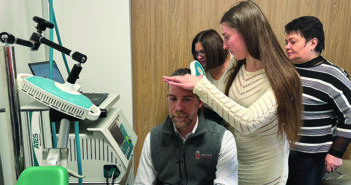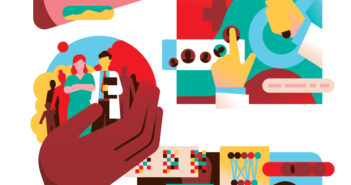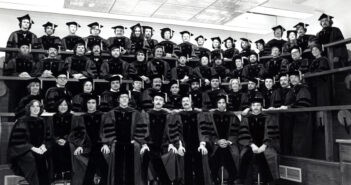Rhode to Medicine program gives students a clear path into a health care career.
Maribel Veiga’s passion for medicine is a deeply personal one: her late father’s battle with cancer motivated her to become a physician, she says.
“It had a major effect on me,” says Veiga, a sophomore at Providence College. “I used to try to cure him with water and massages, thinking it would do something. It’s just the thought that I could do something to help or make him happy that made me want to go into this career.”
Veiga, who was born in the US and raised in Cape Verde, says her family sought treatment in different countries for her father’s condition, but he died when Veiga was just 9 years old. That loss strengthened her resolve to pursue a career in medicine, and that dream has been bolstered with help from the Rhode to Medicine pathway program at Brown.
The four-week program, which started in June 2021, offers pre-health undergraduates from the University of Rhode Island, Providence College, and Rhode Island College firsthand experience in a medical school environment. The program began as Month of Medicine, and is built on the foundation of The Warren Alpert Medical School’s Early Identification Program, says Joseph Diaz MD’96 RES’99 F’01 MPH’09, associate dean for diversity and multicultural affairs.
Each year, the EIP offers a few high-achieving Rhode Island students early, provisional admission to the Medical School following completion of their bachelor’s degree. Diaz frequently connected with students who had applied for the EIP but hadn’t been selected, many due to a lack of exposure to medicine and clinical settings. This was particularly true for students from underserved or underrepresented communities, he says.
“We created the Month of Medicine, where we put out a call for applications for students from diverse backgrounds to take part in a three- to four-week program to expose them to a little bit of what the medical school experience is like,” Diaz says. It included shadowing physicians and hands-on experience to understand concepts like clinical reasoning.
An important element is the opportunity for near-peer mentorship, in which students who just finished their first year at The Warren Alpert Medical School would debrief and discuss the lectures, Diaz says. He and Luckson Omoaregba, MS, director of Pathway Programs, continued to add to Month of Medicine elements like networking opportunities, professional development, and MCAT preparation. As the focus grew beyond a four-week scope, Month of Medicine gradually evolved into Rhode to Medicine.
Rhode to Medicine’s curriculum introduces participants to lessons and experiences similar to what a medical student would take part in. Students are exposed to courses and lectures on subjects like pathophysiology, physical diagnosis, clinical reasoning, and others. Diaz says there is an emphasis on helping students understand what the progression through four years of medical school is like.
“For the first two years of medical school, you’re initially thinking about how the body works and the physiology,” Diaz says. “In the second year we’re thinking about the pathophysiology, and then for the third- and fourth-years you’re applying the classroom information to patient encounters. We try to give them snapshots of each of those years.”
Veiga was no stranger to Brown or its pathway programs; she took part in Week of Medicine in 2022 before her senior year at Central Falls High School. David Upegui, PhD, adjunct lecturer in education at Brown and Veiga’s high school biology teacher, encouraged her to apply to the month-long program.
“I know it’s competitive, and I know a lot of people would love to have this opportunity, so I was truly very happy when I found out I was getting in,” Veiga says.
Brown partners with physicians at Rhode Island Hospital, whom students shadow for up-close exposure to patient interactions. Omoaregba also added a professional seminar series, in which graduates of the program take part in professional development and networking sessions.
For students like Veiga, Rhode to Medicine isn’t simply a crash course in medical education. The hands-on approach and mentorship made the experience feel more “real,” she says. Visits to places like the anatomy lab and simulation labs where students acted as doctors and learned skills like intubation provided a level of exposure that couldn’t be found in a textbook.
“As I went along, I grew and my interest in medicine grew and it made me love it even more,” she says.
Veiga says she had a budding interest in cardiology, but found her time studying emergency room procedures to be particularly useful.
“I never thought about the ER, but I liked what they do and how the doctors talked about it with so much passion,” Veiga says.
In the final days of Rhode to Medicine, Veiga and other students took exams to recap what they learned both inside and outside of classrooms. Diaz notes, however, that students aren’t truly finished with the program after four weeks. Brown faculty and staff continue to check in regularly with participants to offer further guidance in their academic and career paths.
“We’re doing regular check-ins, but we also use our foundational support to provide things like MCAT prep for them,” Diaz says. “We meet with them on a fairly regular basis depending on where they are in their lives and potentially applying to health professional school.”
Success can be challenging to measure, Diaz says: the program doesn’t strictly view success through the lens of whether or not participants attend medical or another professional school.
“Studying in a health professional school is one metric, but not the only one,” he says. “If students are still pursuing careers in health and health sciences, I think that’s also a level of success.”
Keyline Moreno, a University of Rhode Island graduate, joined the first cohort of Rhode to Medicine to provide care to underserved communities. She enjoyed gaining research and academic experience by taking introductory medical school classes, sitting in on grand rounds, and speaking with student mentors. Moreno says she was surprised at the level of support she had once the program finished.
“I have been able to email and meet [Diaz] over the past three years with all of my questions regarding the medical school process, and he has been such a great support system,” she says.
Moreno, who is starting medical school at Howard University, says she’s thankful for her time at Brown.
“I hope to take full advantage of the opportunity, as not many are able to say the same, getting the most I can out of my education to be able to serve underrepresented communities in my professional career,” Moreno says.
Veiga, who is studying biology on the pre-med track at Providence College, says she has greater confidence in everything from anatomy to understanding the patient experience. She encourages other students to take advantage of pathway programs like Rhode to Medicine, even if they doubt themselves.
“If the idea is in your head, it’s there for a reason,” Veiga says. “What I tell myself is that I know I want to do this, and I would rather die trying than not do it all.”




